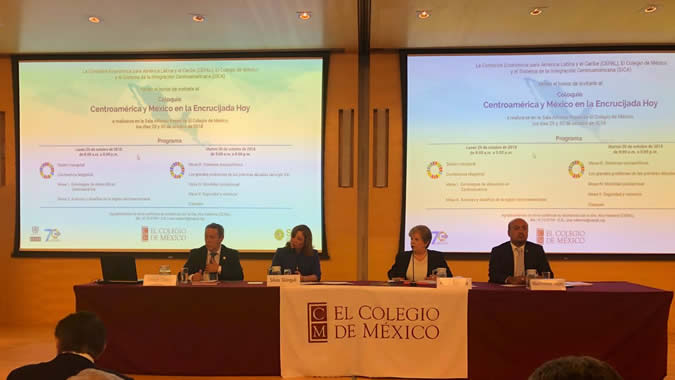Development, Integration and Equality Must be Central America’s Responses to the Complex Global Context: Alicia Bárcena
ECLAC’s Executive Secretary gave a keynote speech in the framework of the colloquium “Central America and Mexico at a crossroads today,” organized by the United Nations regional organization, The College of Mexico and the Central American Integration System (SICA).

The Executive Secretary of the Economic Commission for Latin America and the Caribbean (ECLAC), Alicia Bárcena, affirmed today that Central America’s response to this complex global context must be guided by the principles of the quest for equality, greater productive efficiency and the strengthening of integration, all of this in the framework of the 2030 Agenda for Sustainable Development and its 17 Goals.
The senior United Nations official gave a keynote speech in the framework of the colloquium “Central America and Mexico at a crossroads today,” organized by ECLAC, The College of Mexico and the Central American Integration System (SICA).
Along with Alicia Bárcena, the others inaugurating the event included Silvia Giorguli, President of The College of Mexico; Maximiliano Reyes, on behalf of the designated Foreign Affairs Secretary of Mexico, Marcelo Ebrard; and Vinicio Cerezo, Secretary General of SICA.
During her presentation, ECLAC’s Executive Secretary affirmed that Latin America and the Caribbean must deepen regional integration in the face of this complex global context with the aim of reducing exposure to growing protectionism, moving toward a subregional productive alliance, and supporting diversification and the adding of value to exports.
To this end, she said, it is crucial to make progress on trade facilitation and to reduce non-tariff barriers, improve the quality of infrastructure, promote the creation of new scientific capacities and train in human resources to take advantage of the opportunities of the technological revolution.
She added that “countries must invest in human capital, reducing the gaps in formal education that are transmitted across generations and taking a leap toward postsecondary education. We must eliminate the barriers in access to health that reduce productivity and life expectancy,” she indicated.
ECLAC’s most senior representative recalled that the main causes of migration in countries on the Central American isthmus – basically El Salvador, Guatemala and Honduras – are the lack of jobs or economic crisis in their place of origin, very low income and/or poor working conditions, violence or crime, and, to a lesser extent, family-related motives such as reunification.
In that sense, she noted that with 47.8 million inhabitants, or around 7.4% of the total population of Latin America, Central America recorded average annual growth of 3.9% in the last five years, well above the 0.8% regional average. However, poverty levels continue to be extremely high, mainly in rural areas, with figures that reach 76.1% of the population in Guatemala, 65% in Honduras and 50.1% in Nicaragua.
With regard to inequality, ECLAC’s Executive Secretary specified that the wealthiest quintile of the population in Central America obtains 47% of the income. Likewise, a Central American person from the wealthiest decile receives between 20 and 70 times more income than a person from the poorest decile.
In terms of employment, Alicia Bárcena indicated that today more than 600,000 Central American young people are seeking to enter the labor market, but only around 250,000 new formal jobs are being created.
In light of this reality, one of the options is migration. It is estimated that about 250,000 Central Americans emigrate from their countries. More than half of them are young people, some of them minors, ECLAC’s Executive Secretary stated.
“We aim to grow to equalize and equalize to grow, and to make integration a driver of this, identifying areas of expansion, diversifying with technological innovation, adopting a tax policy that stops evasion and achieving ecological and environmental sustainability that serves as a strategic limit on investment, innovation and production,” she added.
“There is an opportunity for development, for integration with equality,” she concluded.
In the context of her participation in the colloquium, Alicia Bárcena presented the book Development, Integration and Equality: Central America’s Response to the Globalization Crisis, a publication with which ECLAC seeks to contribute to the debate and present a diagnosis that addresses macroeconomic dimensions, productive and technological development, international trade, the social outlook, demographic reality and climate change.
Related content
Coloquio Centroamérica y México en la Encrucijada Hoy
Palabras de Alicia Bárcena, Secretaria ejecutiva de la CEPAL.
Desarrollo, integración e igualdad: la respuesta de Centroamérica a la crisis de la globalización
Presentación de Alicia Bárcena, Secretaria Ejecutiva de la CEPAL, en el coloquio Centroamérica y México en la encrucijada hoy (México).
Subregional headquarter(s) and office(s)
Country(ies)
- Latin America and the Caribbean
Related project(s)
Contact
Public Information Unit
- prensa@cepal.org
- (56 2) 2210 2040